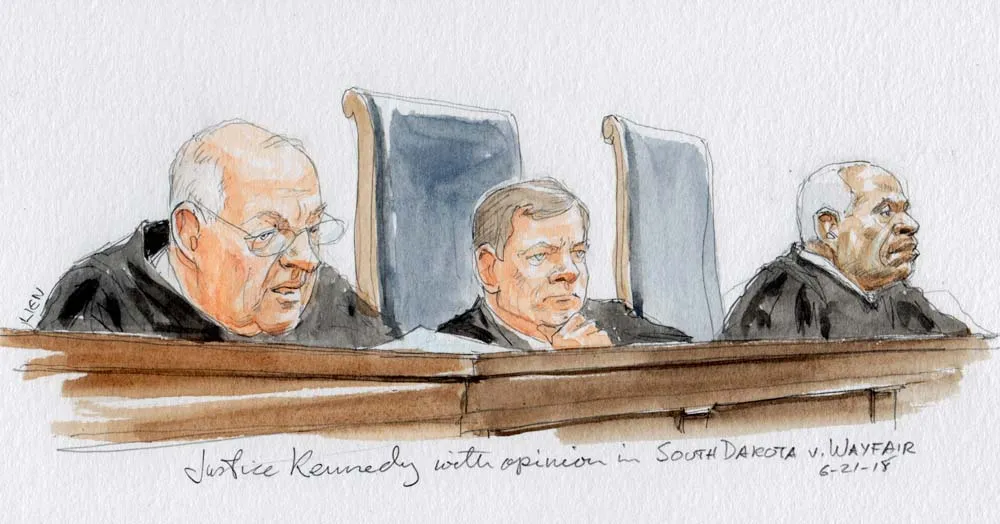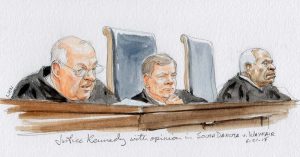Opinion analysis: Court expands states’ ability to require internet retailers to collect sales tax

on Jun 21, 2018 at 4:15 pm

Justice Anthony Kennedy had essentially invited a test case to overrule Quill Corp. v. North Dakota and its physical-nexus rule for the states being able to require out-of-state retailers to collect sales tax. So it was not a huge surprise that Kennedy had the opinion for the court today in South Dakota v. Wayfair.
Except, of course, that the oral argument in the case in April had left many observers wondering whether the court could get to a majority willing to overrule the 1992 Quill decision and its 1967 predecessor, National Bellas Hess Inc. v. Illinois Department of Revenue.
In an unusual voting lineup, the court did reach such a majority, and Kennedy announced that the physical-presence rule was unsound and incorrect, and that Quill and Bellas Hess were overruled.
“In effect, Quill has come to serve as a judicially created tax shelter for businesses that decide to limit their physical presence and still sell their goods and services to a state’s consumers—something that has become easier and more prevalent as technology has advanced,” Kennedy wrote. “This Court should not prevent states from collecting lawful taxes through a physical presence rule that can be satisfied only if there is an employee or a building in the state.”
The opinion was joined by Justices Clarence Thomas, Ruth Bader Ginsburg, Samuel Alito and Neil Gorsuch, with Thomas and Gorsuch writing short concurrences.
Chief Justice John Roberts wrote a dissent that was joined by Justices Stephen Breyer, Sonia Sotomayor and Elena Kagan.
“E-commerce has grown into a significant and vibrant part of our national economy against the backdrop of established rules, including the physical-presence rule,” Roberts said. “Any alteration to those rules with the potential to disrupt the development of such a critical segment of the economy should be undertaken by Congress.”
The court was considering whether to overrule precedents that date from eras when out-of-state shopping meant shopping by mail-order catalog.
The states have been losing out on billions in sales tax revenue over the years, even as some big internet retailers such as Amazon have begun collecting sales tax regardless of whether they have a physical presence in the buyer’s state.
The states, along with some brick-and-mortar retailers and mom-and-pop stores that have been on the losing end of Quill, urged Congress to come to their rescue, but to no result.
In a concurrence in a 2015 Colorado case related to state sales and use taxes, Kennedy called for the court to re-examine Bellas Hess and Quill.
That prompted South Dakota, which has no state income tax and relies heavily on its sales and use taxes, to pass a new law in 2016. The statute imposes an “economic presence test” on out-of-state retailers to subject them to sales tax liability. The measure applies to any retailer with at least $100,000 in sales or at least 200 individual transactions in the state.
South Dakota sued several out-of-state internet retailers, seeking to require them to begin collecting taxes. Three decided to fight — Wayfair, a retailer of home goods; Overstock.com, a general retailer; and Newegg.com, which specializes in tech products.
The South Dakota Supreme Court agreed with the retailers that Quill remained the controlling precedent, and that the state could not bypass the physical-presence rule to impose sales taxes on the out-of-state retailers.
In his opinion for the court in Wayfair, Kennedy said that the physical-presence rule as defined and enforced in Bellas Hess and Quill “is an extraordinary imposition by the judiciary on states’ authority to collect taxes and perform critical public functions.”
He noted that 41 states, two U.S. territories, and the District of Columbia had joined an amicus brief on South Dakota’s side asking the court to reject the Quill test.
“That [the physical-presence rule] allows remote sellers to escape an obligation to remit a lawful state tax is unfair and unjust,” Kennedy said. “It is unfair and unjust to those competitors, both local and out of state, who must remit the tax; to the consumers who pay the tax; and to the states that seek fair enforcement of the sales tax, a tax many states for many years have considered an indispensable source for raising revenue.”
He cited marketing materials from Wayfair. “Its advertising seeks to create an image of beautiful, peaceful homes, but it also says that ‘one of the best things about buying through Wayfair is that we do not have to charge sales tax.’ What Wayfair ignores in its subtle offer to assist in tax evasion is that creating a dream home assumes solvent state and local governments.”
There is “nothing unfair about requiring companies that avail themselves of the states’ benefits to bear an equal share of the burden of tax collection,” Kennedy said.
Kennedy discussed at some length the changes to the national economy and retailing brought about by the internet.
“The Internet’s prevalence and power have changed the dynamics of the national economy,” he said, noting that mail-order sales in the United States in 1992 totaled some $180 billion, while e-commerce sales last year were estimated to be $453.5 billion. This expansion has increased the revenue shortfall faced by the states, he continued, citing estimates that range from $8 billion to $33 billion.
The retailers’ arguments based on reliance interests in the Quill rule were unpersuasive because the physical-presence rule has not been as clear and easy to apply as suggested, Kennedy said. Nationwide sales-tax collection may impose a burden on smaller sellers, he said, but “eventually, software that is available at a reasonable cost may make it easier for small businesses to cope with these problems.”
“And in all events, Congress may legislate to address these problems if it deems it necessary and fit to do so,” Kennedy said.
Thomas said in his concurrence that he should have joined Justice Byron White’s dissent in Quill in 1992. Gorsuch’s concurrence said, “My agreement with the court’s discussion of the history of our dormant commerce clause jurisprudence, however, should not be mistaken for agreement with all aspects of the doctrine.”
In his dissent, Roberts said he agreed that Bellas Hess was wrongly decided, but he went on to state that the majority’s view that the internet’s prevalence and power have changed the dynamic of the national economy “is the very reason that I oppose discarding the physical-presence rule.”
“If stare decisis applied with special force in Quill, it should be an even greater impediment to overruling precedent now, particularly since this Court in Quill tossed the ball into Congress’s court, for acceptance or not as that branch elects,” the chief justice said.
Roberts noted that Congress has been considering whether to alter the physical-presence rule, and “nothing in today’s decision precludes Congress from continuing to seek a legislative solution. But by suddenly changing the ground rules, the Court may have waylaid Congress’s consideration of the issue.”
The majority “proceeds with an inexplicable sense of urgency,” the chief justice said, and it “breezily disregards the costs that its decision will impose on retailers.”
There are complex distinctions made in more than 10,000 taxing jurisdictions, he said.
“New Jersey knitters pay sales tax on yarn purchased for art projects, but not on yarn earmarked for sweaters,” Roberts said, while Texas imposes a sales tax on plain deodorant but not on deodorant with antiperspirant, and Illinois treats Twix and Snickers bars differently for sales-tax purposes.
“The Court is of course correct that the nation’s economy has changed dramatically since the time that Bellas Hess and Quill roamed the earth,” Roberts said. “I fear the Court today is compounding its past error by trying to fix it in a totally different era. … I would let Congress decide whether to depart from the physical-presence rule that has governed this area for half a century.”
[Disclosure: Goldstein & Russell, P.C., whose attorneys contribute to this blog in various capacities, is among the counsel to the petitioner in this case. The author of this post is not affiliated with the firm.]



